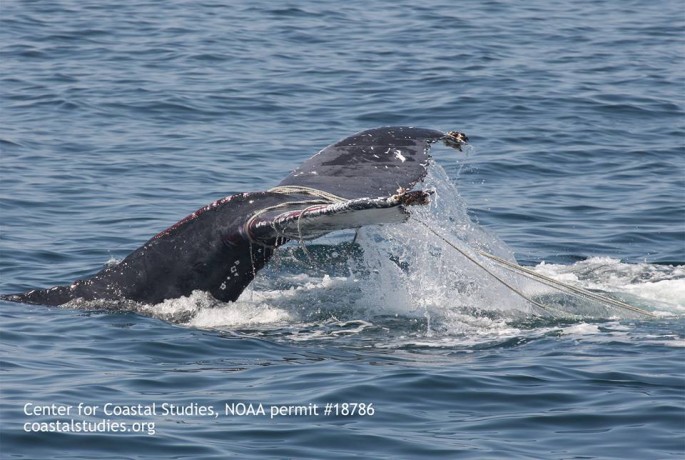A humpback whale was entangled by ropes and was in distress due to a great white shark bite where the predator prowled the waters on Saturday. Scientists have since then rescued the whale.
Center for Coastal Studies researchers were on a research expedition about gas exhalations by humpback whales when they stumbled upon a young whale on Stellwage Bank which is a popular feeding ground for whales located 5 miles north of Provincetown, Massachusetts.
The whale was unfortunately hogtied from its mouth to its tail and rendered immobile from the water surface which sustained a rather large bite injury on its left flank from a shark.
According to CCS director of Humpback Whale Research Jooke Robbins, the first time she saw a shark attack a living whale before, was a calf that got separated in Hawaii however this accident is not common here. Sharks are most likely to target helpless whales that are usually incapacitated or sick ones and other vulnerable, weak animals.
The whale was entangled in ropes that ran through its baleen and got wrapped around its flukes making it more vulnerable to predators since it cannot utilize its tail to escape or for defense says CCS executive assistant, Cathrine Macort. She adds that the researchers are not aware of how long the whale has been entangled and struggling with its ordeal.
Robbins had initially thought that the animal was merely resting since it was floating on its back, revealing it on the water surface however, when she got closer to further inspect the creature, she spied the rope and the bloody whale dorsal fin.
She adds that this entanglement prevented the whale to move normally which was most likely limited its actions to defend itself from the shark. The team immediately sought help from the center's Marine Animal Entanglement Response team to ensure its safety from the 15 foot shark where the team started its disentanglement operation.
The team carefully used a hook shaped knife that was connected on a long pole to cut the rope starting at the mouth of the whale. This made the creature to curl itself and to correct its posture. When the whale was returned to its normal position, the shark somehow lost its interest and left the whale alone according to director of the Marine Animal Entanglement Response team, Scott Landry.
Landry also says that since boating season is near, any marine animal entanglement that involves whales, sea turtles or others animals should be immediately reported to the Coast Guard or the Marine Animal Entanglement Response Hotline with contact number 1-800-900-3622. Boaters should also stay at a safe distance and not attempt to disentangle the animal on their own until trained emergency response teams arrive.



























